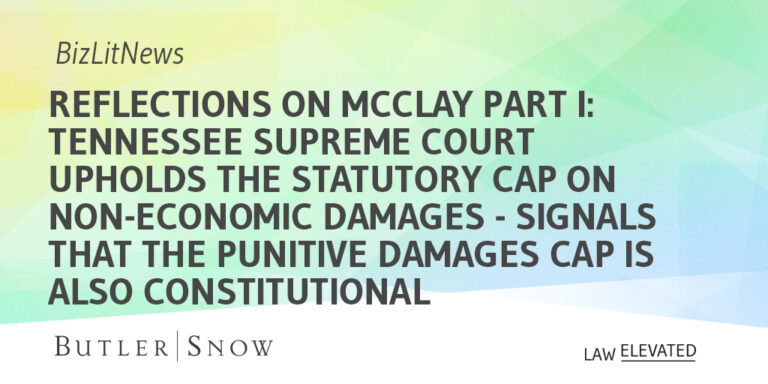On February 26, 2020, the Tennessee Supreme Court affirmed the constitutionality of the cap on noneconomic damages found in Tenn. Code Ann. § 29-39-102. McClay v. Airport Management Services, LLC, 2020 WL 915980 (Tenn. 2020).
McClay is a personal injury case that was filed in the United States District Court for the Middle District of Tennessee. Plaintiff Jodi McClay filed suit against Airport Management Services, LLC, seeking damages for injuries she sustained in a Hudson store at the Nashville International Airport in August 2016. A jury returned a verdict for Plaintiff in the amount of $444,500 for future medical expenses and $930,000 for noneconomic damages, including pain and suffering, permanent injury, and loss of enjoyment of life. The District Court entered judgment against the defendant in accordance with the verdict. Defendant then moved to apply the statutory cap on noneconomic damages in Tenn. Code Ann. § 29-39-102, which generally limits noneconomic damages in civil liability actions to $750,000. McClay responded to Defendant’s motion by arguing the statutory cap on noneconomic damages is unconstitutional because it allegedly violated the right to a trial by jury, violated separate of powers principles and disproportionately discriminated against women. The District Court certified the questions to the Tennessee Supreme Court.
Writing for the majority, Justice Bivens wrote, “We conclude that the right to trial by jury under the Tennessee Constitution is satisfied when an unbiased and impartial jury makes a factual determination regarding the amount of noneconomic damages, if any, sustained by the plaintiff. That right is not violated when a judge then applies, as a matter of law, the statutory cap on noneconomic damages. Thus, we hold that the statutory cap on noneconomic damages in Tenn. Code Ann. § 29-39-102 does not violate the right to trial by jury under the Tennessee Constitution.”
Rejecting the argument that the non-economic damages cap is a violative of separation of powers principles, the Court held, “the statutory cap on noneconomic damages is a substantive change in the law that was within the General Assembly’s legislative authority to enact. The statutory cap does not interfere with the judicial power of the courts to interpret and apply law. To the contrary, courts exercise their judicial authority, and fulfill their constitutional responsibilities, by applying the statutory cap on noneconomic damages to the cases before them. Thus, we hold that the statutory cap on noneconomic damages in Tenn. Code Ann. § 29-39-102 does not violate the separation of powers doctrine under the Tennessee Constitution.”
As to the argument that the cap on non-economic damages disproportionately discriminates against women, the Court found that there was no evidence of discriminatory intent behind enactment of the cap. The Court found that, “Accordingly, without evidence of discriminatory purpose, disparate impact alone does not violate the equal protection provisions of the Tennessee Constitution. Therefore, with no allegation or evidence that the General Assembly acted with the purpose of discriminating against women in enacting the statutory cap on noneconomic damages, we hold that Tennessee Code Annotated section 29-39-102 does not violate the Tennessee Constitution by discriminating disproportionately against women.”
While the McClay decision is limited to the constitutionality of the non-economic damages cap found in Tenn. Code Ann. § 29-39-102, it is also a clear signal that the cap on punitive damages found in Tenn. Code Ann. § 29-39-104 is also constitutional. In 2018, the Sixth Circuit found the punitive damages cap to be unconstitutional. Lindenberg v. Jackson National Life Insurance Company, 912 F.3d 348 (6th Cir. 2018). In so ruling, the Sixth Circuit refused to certify the question to the Tennessee Supreme Court and instead made an Erie guess as to how the Tennessee Supreme Court would rule.
In McClay, the Tennessee Supreme Court was careful to say that the constitutionality of the punitive damages cap was not before them and therefore they were not ruling on it. However, the Supreme Court, in footnote 6 of the opinion, stated, “we also find the reasoning of the majority in Lindenberg unpersuasive in this case.” The Tennessee Supreme Court went on to chide the Sixth Circuit for failing to certify the question of the constitutionality of the punitive damages cap to them saying, “we simply point out that the procedure for certifying questions of state law to this Court is designed to promote judicial efficiency and comity, and to protect this State’s sovereignty.”
The arguments raised in the Lindenberg case to invalidate the punitive damages cap are the same arguments which McClay asserted to invalidate the non-economic damages cap. Having rejected those arguments in McClay and specifically stating that they found the reasoning of the majority in Lindenberg “unpersuasive,” it appears the Tennessee Supreme Court would affirm the constitutionality of the punitive damages cap if that issue were before them. Lindenberg may wind up being an isolated outlier and not the beginning of a wave of decisions invalidating the punitive damages cap.
